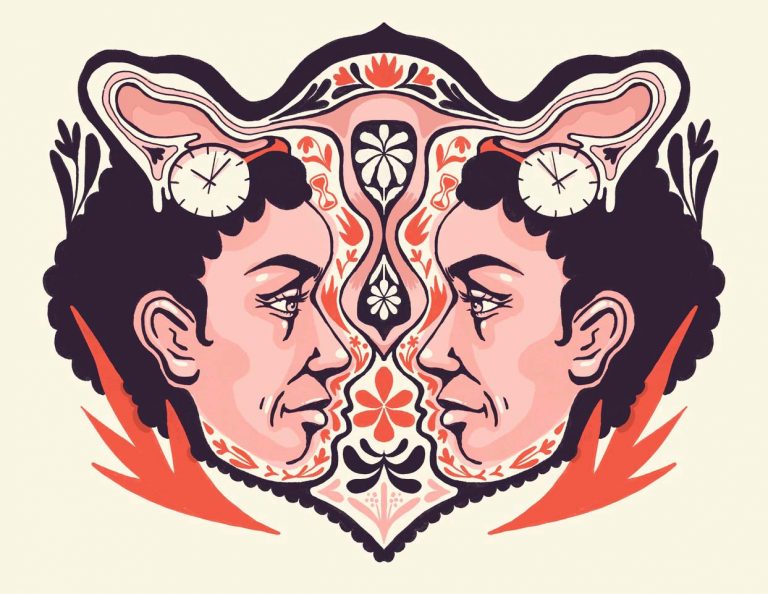I am a strong-willed, direct, peri-menopausal woman having a hot flash during a heat wave! I do not have time for your passive-aggressive bullshit!
Fuck, did I say that out loud? I didn’t, but I came close.
My partner and I have what we call the trifecta. It means you are hot, hungry, AND tired all at once, and at least one of these things needs to be resolved immediately or shit will hit the fan. Neither one of us imagined a quadfecta—hot, hungry, tired and peri-menopausal!
August brought a heat wave and my body brought fluctuating hormones leading to hot flashes. And because perimenopause had also brought irritability, fatigue and sleep disturbances, I was not at my best.
For those of you not familiar with menopause, I will explain. Menopause is the moment when someone has not had a menstrual period in twelve consecutive months.
That is all—it is not a disease or a disorder or a medical problem.
Menopause is a natural part of the aging process. We do, however, often use the word menopause to describe the entire menopausal transition, which lasts for many years.
The menopausal transition includes perimenopause—the years, often in your late forties, leading up to menopause—and post-menopause—the years after menopause. Perimenopause is the time associated with negative physical symptoms such as night sweats, hot flashes, irregular periods, fatigue, vaginal dryness, sleep disturbances, weight gain, headaches, joint pain, change in sex drive and bladder control concerns. It is also associated with mood and thought changes such as, irritability, anger, sadness, anxiety, memory loss, brain fog, decreased concentration and feelings of panic. All these symptoms are caused by changing levels of hormones, specifically a decrease in estrogen.
These symptoms will be different for each person. Some people will have few, some people will have many and a small percentage will have none.
The symptoms can last for three to ten years and, for me, this is the most difficult part—not knowing how long it will last, not knowing how many more heat waves I will have to endure while having a hot flash. I do, however, find comfort in the fact that the symptoms will go away or, at the very least, decrease.
For others, the most difficult part may be the confusion about what is happening because there is little to no widespread education about menopause. Many people experiencing perimenopause-relatedal symptoms may not understand they are associated with the menopause transition and therefore experience fear, shame and anxiety about what is happening to their mind and body.
Before I learned about menopause, I thought the only symptom was hot flashes. This seems to be what people discuss the most, possibly because it is often visible with sweat and redness.
For me, a hot flash feels like I am on fire on the inside, mostly in my chest, stomach and thighs. This often leads to becoming sweaty.
What people do not mention is that, when the hot flash is over, you are left feeling cold as the air hits your sweat and you have taken most of your clothes off.
Because it is the negative symptoms surrounding menopause that are often discussed, it often leads to people dreading the experience and expecting the worst. But if we spoke about menopause in a realistic manner and prepared people for the possible side effects, people would have a much better experience. And of course, we also need to discuss the positives of menopause.
For some, the ceesation of menstruation and no longer worrying about getting pregnant is a relief or even cause for celebration and for some this comes with mixed emotions or disappointment. Also due to the stabilizing of hormones, mood swings will decrease and when you become angry, sad or tearful, you will know why.
I read a quote by Margaret Mead, the legendary anthropologist, which said, “There is no more creative force in the world than a menopausal woman with zest.”
Mead coined the term post-menopausal zest in the 1950’s, and it means a physical and psychological surge of energy which happens post-menopause.
This resonated with me. After the dust settles and hormones stabilize, I will hopefully be a healthy middle-aged woman, refocused, full of new energy and ready to take on the world in a new and improved manner with clarity, experience and confidence backing me up.
Post-menopausal zest, or PMZ, gives me great hope and a sense of freedom. Hope that my best self is yet to come and the freedom to be exactly the woman I want to be.
We all need to understand menopause better to understand the people experiencing it better. If it is understood as the natural aging process it is, people may feel comfortable talking about it and this could lead to increased hope and freedom for those experiencing it.
I try to talk about menopause openly and frequently in the hopes that it will increase people’s comfort and knowledge. I let people know when I am having a hot flash, and I do not apologize for my sweat.
So, if you run into me and I seem more irritable than usual, it’s the menopause, but I am also probably sick of your bullshit.

